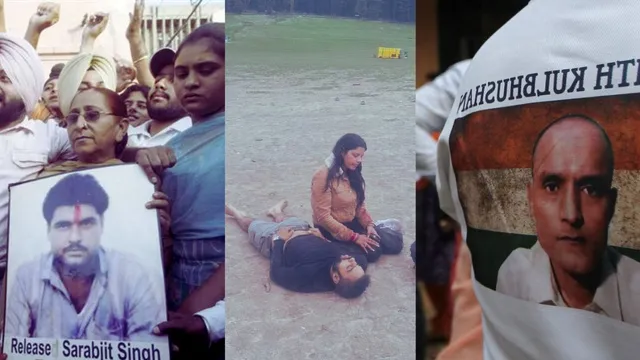- By Supratik Das
- Sat, 17 May 2025 11:09 AM (IST)
- Source:JND
Twelve years since Sarabjit Singh was brutally killed in Lahore's Kot Lakhpat Jail, memories of the humiliation his family was subjected to at the hands of Pakistani authorities continue to haunt. From wiping off the sindoor of his wife to manhandling his teenage daughters, Pakistan's treatment of Indian women back then has a strange echo of disrespect given to Sarbajit's family years later, and again now, once more, after the recent Pahalgam attack, the same pattern reappears. But this time, India retaliated, not merely in sentiment, but in firepower.
In 2008, when Sarbajit's wife, Sukhpreet Kaur, and sister, Dalbir Kaur, went to see Sarabjit Singh in Lahore jail for the first time in 18 years, their pride was torn apart even before the reunion. As per Dalbir Kaur, a lady officer forcibly removed the sindoor from Sukhpreet's forehead. “She pulled out a handkerchief and rubbed the sindoor off my bhabhi’s forehead. We were asked to remove bangles, mangalsutras, and even kadas. They treated us like criminals,” Dalbir Kaur told PTI. As if humiliation was not enough, the family was forced to taste the homemade dish, bharwan karela, they had brought for Sarabjit, under suspicion of foul play. “They shoved it into our mouths before allowing us to hand it to him. We weren’t treated like visitors, but like spies,” she recalled. Their passports, which were deposited at a Lahore Gurudwara on the orders of Pakistani authorities, mysteriously "disappeared," causing a delay in their departure.
Years later, when Kulbhushan Jadhav's wife and mother were granted a supervised visit with him in Islamabad, they were also deprived of their bindis, mangalsutras, and bangles. Their shoes were removed, forcibly forced to change into different clothes by force. The chilling similarity did not go unnoticed by India.
Who Was Sarabjit Singh?
Sarabjit Singh Attwal lived in Bhikhiwind, a border village of Punjab's Tarn Taran district, only a few kilometers away from the India-Pakistan border. He was a farmer by profession, and according to reports, he had crossed into Pakistani territory drunk in August 1990. He was soon arrested by Pakistani officials and charged with being "Manjit Singh," a convicted Indian spy who had allegedly conducted bomb explosions in Lahore and Faisalabad that killed 14 Pakistani nationals. Despite India's repeated claim that he was a civilian who had wandered across the border, Pakistan tried and found him guilty and sentenced him to death in 1991 for the crimes of terrorism and espionage.
He spent over 22 years in Lahore’s Kot Lakhpat Jail under extremely harsh conditions. On April 26, 2013, Sarabjit was brutally assaulted within the prison by other inmates using sharp objects, iron rods, and bricks. He was severely injured with multiple head and spine injuries and fell into a coma. Despite requests by India to have him transferred for treatment or released on humanitarian grounds, Pakistan denied. Later, he died on May 1, 2013. His body was returned to India, where a second autopsy corroborated that his organs were extracted and he was severely injured to the head, indicating an intent to murder. His death made him an emblem of India's ire and unfulfilled resentment against Pakistan's actions on Indian prisoners.
Also read: ‘Pakistan Is A Well Of Death’: 8 Years On, Uzma Ahmed’s Safe Return Remains A Diplomatic Milestone
Pahalgam Attack Sparks 'Operation Sindoor': India Hits Back
Fast forward to April 22, 2025, terror struck once again, this time in Pahalgam, where 26 civilians were killed. Their widowed wives, dressed in mangalsutra and sindoor, became the new Pakistani-backed terror face. After that, India chose to retaliate. India launched Operation Sindoor, a coordinated retaliatory strike executed with drones and precision-guided missiles targeting major terror launchpads, including Jaish-e-Mohammad’s base in Bahawalpur and Lashkar-e-Taiba’s facility in Muridke between 1:05 a.m. and 1:30 a.m. After that, Prime Minister Narendra Modi said the name was symbolic,c that signifies that India will no longer accept any physical or symbolic on the dignity of its women. “Today, every terrorist and every terror organisation has come to know what the consequences are of wiping the sindoor from the foreheads of our sisters and daughters,” PM Modi said during his national address, his voice charged with emotion and resolve.
Twelve years have elapsed since Sarabjit's incident, but India's message to Pakistan has never been sharper; the era of muteness is over. From the shameful treatment of Indian women in Lahore to the latest carnage in Pahalgam, Pakistan's effort at intimidation and humiliation has received its reply not only in speeches but in action.

